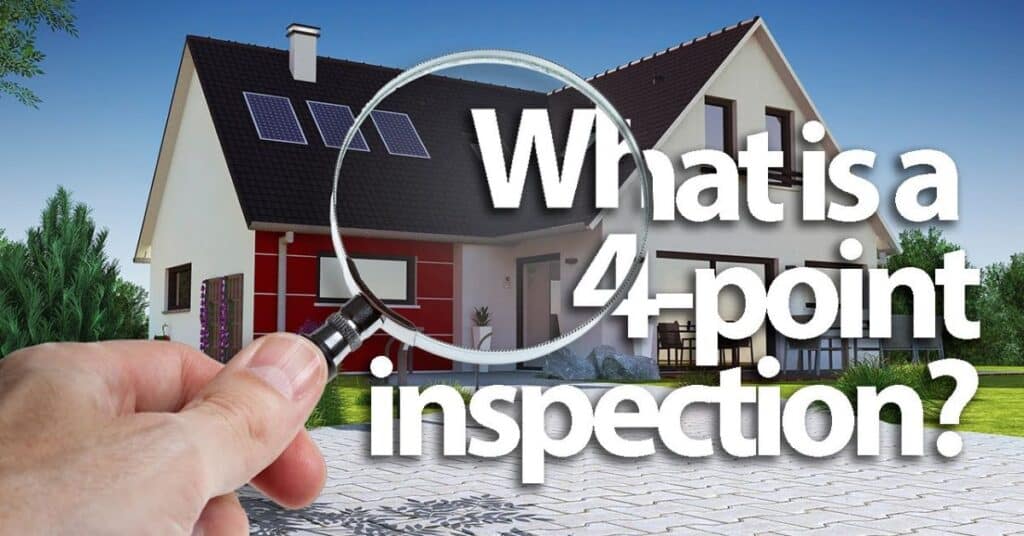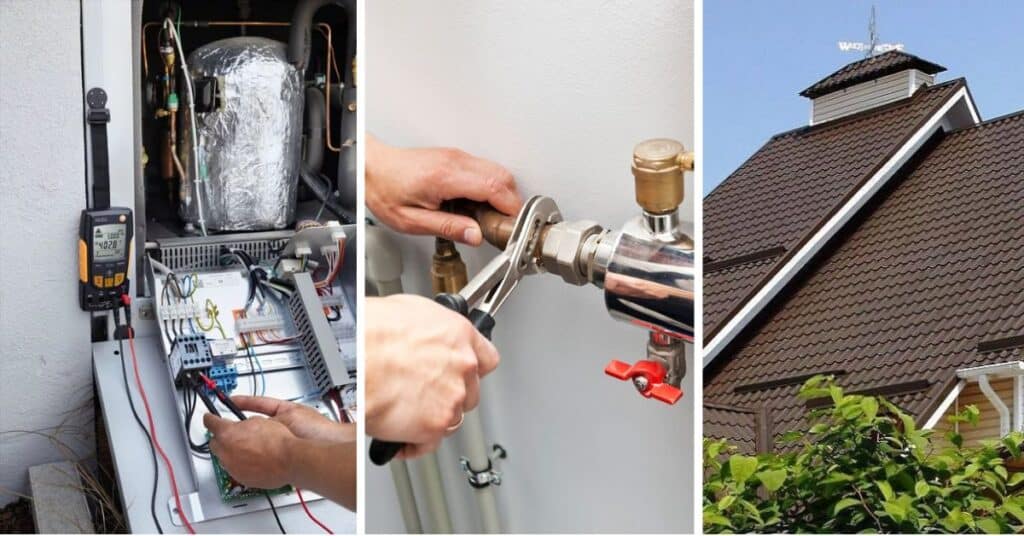Preparing for a 4-point home inspection? Smart move! It’s crucial for insurance and peace of mind. Here’s how to get ready: First, fix any visible issues you know about. Next, check your HVAC, plumbing, electrical, and roofing. Then, hire professionals if needed. Finally, relax knowing you’ve done your best!
What Is a 4 Point Inspection?

Primarily, a four-point home inspection is an analysis of the general condition of your property. We are preparing for a 4-point home inspection that is vital for a smooth process. Here are four key points to focus on. Which is essential for a 4-point home inspection. It’s called 4-point because it covers the following areas:
- Roofing
- Plumbing
- Electrical
- HVAC
Homeowners’ insurance companies often ask for this inspection to determine coverage eligibility or policy renewal. It’s a way for insurers to assess the property’s condition from a neutral party’s report.
Insurance firms are cautious with older homes, fearing increased liabilities due to potential issues. For instance, a 25-year-old house might have hidden electrical or plumbing problems, leading to costly repairs.
A 4-point home inspection allows insurers to estimate potential repair and maintenance costs, viewing it as a financial risk. Homeowners also benefit, as it helps them gauge if the property is worth investing in before securing financing.
Identifying issues early can prevent future costly problems, making it a valuable investment for both parties.
What are the benefits of a 4 point home inspection?
Four-point home inspections have many benefits, even if not mandated by your state. They’re quick, affordable, and straightforward. By identifying issues early, they prevent larger problems down the line.
Whether buying or selling, they provide a clear picture of your home’s condition. Overall, they’re a smart investment for homeowners and insurers alike.
Why The Results of a 4 Point Inspection Matter
Understanding the significance of passing a 4-point home inspection is essential. It not only assures insurance policy approval but also grants peace of mind to homeowners.
- High marks lead to insurance policy approval.
- Inspection benefits extend beyond insurer risk assessment.
- Passing provides understanding of home safety, reducing future risks.
- Grants peace of mind to homeowners.
- Can lead to better insurance rates.
- Reduces possibility of accidents and property damage.
- Enhances overall value of property.
What Does a 4 Point Inspection Cover?

When you hire a professional house inspector to carry out a four-point home inspection, they’ll check the following components:
HVAC System
HVAC is an abbreviation for heating, ventilation, and air conditioning. It’s one of the most important systems in your home as it helps regulate climate control. If your HVAC is outdated and not well-maintained, it accumulates a lot of dust which leads to problems with air circulation and quality. If left unchecked, it poses a risk of health hazards.
What does a professional home inspector look at when inspecting an HVAC unit?
Wondering what a professional home inspector examines in an HVAC unit? Let’s delve into the specifics to understand what factors they consider during their inspection.
- Age and Condition: While not the sole factor, inspectors consider the age and condition of your HVAC system. This insight helps determine its life expectancy and maintenance history.
- Functionality: Passing inspection requires proper functionality. HVAC systems must effectively heat and cool your home, with appropriately sized units. Safety concerns exclude window AC units, fireplaces, and oil furnaces as primary heating or cooling sources.
- Recommendations: If your HVAC system shows no evident issues, you’re likely in the clear. However, systems over 20 years old may warrant replacement to ensure efficiency and safety.
Plumbing System
The licensed home inspector will check your home’s plumbing system to ascertain that there are no leakages. The plumbing system’s age and material used are also important as you can use it to tell its expectancy.
The inspector will also check all water supply lines through the house to ensure water is circulating well. The hot water heater is another important aspect that will be checked.
Here are the key points regarding plumbing in a 4-Point home inspection:
- Water Supply: Ensure, there are no leaks in the plumbing system. Inspectors will check for proper water pressure. They may also check the condition of pipes for any signs of damage.
- Water Heater: Inspectors will check for signs of leaks, corrosion, or other issues that may affect its performance. The water heater will be inspected to ensure that it is properly functioning.
- Drainage: The inspector will check the drainage system to ensure that sinks, showers, and toilets are draining correctly and properly. Inspectors will check for corrosion, signs of leaks, or other issues that may affect its performance.
Fixtures Inspectors will examine faucets, toilets, and other fixtures for proper functionality and leaks. All aspects of the plumbing system to ensure that it is in good condition and functioning properly.
Electrical System
We describe four key points about electricity for a 4 -Point home inspection:
- Electrical Wiring Inspection: You should examine the electrical wiring throughout the home for any exposed wires improper connections and fraying. Check for any outdated or hazardous wiring materials such as knob and tube wiring, aluminum wiring, or cloth-covered wires.
- Electrical Panel Inspection: You must check the electrical panel (breaker box) for any damage, signs of wear or overloading. There are no loose connections and verify. That breakers are properly labeled.
- 3 Outlet and Switch Inspection: You should inspect switches for any signs of damage, wear, or loose connections. You should pay special attention to areas with water exposure like outdoors, outlets, kitchens and bathrooms. Test each outlet to ensure they are properly grounded and functioning correctly.
- GFCI and AFCI Protection: You should ensure that Ground Fault Circuit Interrupters (GFCIs) are installed in appropriate areas such as kitchens, bathrooms, and outdoor outlets to protect against electrical shocks.
- Ensure you should be checked for Arc Fault Circuit Interrupters (AFCIs) to prevent electrical fires by detecting dangerous arcing faults in the electrical system.
- Inspect the HVAC system: To maintain optimal airflow by regularly changing the air filter. It can prevent issues like frozen evaporator coils. And if your system is older and continually problematic, upgrading to a newer HVAC unit might be a worthwhile investment provided it’s within your budget.
On the other hand, however, other issues will lead to home inspection failure as they are uninsurable. They are:
- Fuse boxes and fuses
- Aluminum branch wiring
- Sheath and cloth wiring
- Knob and tube wiring
- Double-tapped breaker
Roofing
Roofing inspection is known for how in-depth and comprehensive it is. While your roof’s design is fundamental to the house structure, it also affects your home’s energy efficiency and influences whether mold accumulates in your house. As such, bad roofing could pose health hazards and other safety risks that could lead to inspection failure.
Read This Blog: HOW MUCH IS HOME INSURANCE FOR MULTI-FAMILY HOMES IN BROOKLYN NY
What does the inspector check during roofing inspection:
- Age: Like other house components, roofing should be replaced every 20 years. Aged roofs will show cracks, curls, and missing roof shingles.
- Leakage: A leaking roof is a sign of deterioration. Leaking will cause even more costly issues in your home.
- Shape: Unknown to many, roof shaping affects the house’s ability to persevere in harsh weather conditions. For example, if you live in an area with high winds, hip roofs would be the best shape.
- Other signs of deterioration: A poorly done or older roof will have water damage because of pools of water on the surface. Inspectors will be on the lookout for such signs that could lead to health and safety hazards.
Is a 4 Point Inspection Same As a Home Inspection?
A four point inspection is not synonymous with a full home inspection. Insurance companies use a four-point inspection report when putting together a policy for your home, but do not require a full home inspection.
With a four-point inspection, the focus is only on the HVAC, plumbing, electrical, and roofing systems. A full home inspection covers everything in a four point inspection, plus the following:
- House structural integrity
- Appliances
- Doors and windows
- Outlets
- Insulation
- Drainage
While an insurer doesn’t require a comprehensive home inspection, it’s important that you do it before purchasing a home. A full home inspection helps you know the home’s value and condition.
Also, not all homes will require a four-point inspection. You’re most likely going to need it when purchasing an older home, mostly 20 years and older.
Home inspection requirements depend on the state you’re located in. For instance, inspection requirements for Florida may not be the same as in another state.
In Florida, you have to get a four-point inspection regardless of the home’s age. Some insurance companies may also require one regardless of the state you’re in.
Full home inspections are not a requirement but are seen as due diligence. Carrying out a full inspection before buying a home will help you see whether the purchase is worth it.
Can You Fail a 4 Point Inspection?

While you may wonder how to pass a 4-point home inspection, in actuality, these inspections are not performed on a pass/fall basis. They’ll simply determine the condition of the home to help the insurance company make a decision.
So if the insurer denies or refuses to extend your coverage that could be considered failing the 4 point inspection in a way. In the event you’re purchasing a property, you can’t do anything to increase the marks on the inspection since the seller is still responsible for bringing the home up to standards.
This is why we’ll focus on homeowners whose homes are approaching the 20-year mark and are looking to prepare for a 4 point inspection.
What Do You Do If You Fail a Four Point Inspection?
If your home fails a four-point inspection, there’s no in between it’s a pass or fail situation. Failure often stems from issues like roof damage, dysfunctional HVAC systems, faulty wiring, or plumbing problems.
Insurance companies handle failed inspections differently; some may refuse coverage, while others might offer alternatives. As a buyer, you can negotiate repairs with the seller, seek insurers without inspection requirements, or discuss options with your insurance provider.
Before deciding, consult a contractor for repair estimates. Some insurers may provide temporary coverage, allowing you to address issues later on.
How Much Does a Four Point Inspection Cost?
The price of doing a four-point inspection varies depending on the state and insurance company. However, you can estimate it to cost $50 for a low-end home and up to $150 for a high-end house.
If you want to save some cash, you can ask your insurer to recommend an affordable inspector. They usually have a roll of inexpensive home inspectors you can use in your state.
Also, if you’re buying an older home, you can negotiate with the inspector. Some inspectors can offer a free four-point inspection when carrying out a full home inspection.
How Long is a 4-Point Inspection Good For?

Typically, a four point inspection report is valid for a year. However, this is not always the case. Some insurers may continue using the same report for a few years unless legal requirements in your area put a cap on the number of years an inspection report can be used, or you make major changes in your home.
When switching insurers, some companies may allow you to use a four-point inspection report from another insurer as long as it’s less than three years old. Always ask your insurer how often you’ll need to carry out a 4 point inspection.
Key Points
A four-point inspection report is necessary for insurers to know the amount of liability your home poses. Getting one is necessary whether you’re trying to get coverage for a new home you just bought or renewing a policy for your existing home.
The four point inspection covers the HVAC, electrical, roofing, and plumbing systems. If your home passes, you can proceed to purchase and get insurance coverage or renew the policy. On the other hand, if it fails, you can negotiate with the seller and insurer to get other options that are favorable for all parties.
Final Thought’s
Preparing for a 4-point home inspection is crucial for homeowners seeking insurance coverage. It not only ensures safety but also provides peace of mind and potential savings on insurance premiums.
By addressing any issues found during the inspection and staying proactive in home maintenance, homeowners can safeguard their property, mitigate risks, and maintain a valuable investment for years to come.
Frequently Asked Question
What will fail a 4-point inspection in Florida?
A 4-point inspection in Florida may fail due to issues like roof damage, malfunctioning HVAC systems, faulty wiring, or plumbing problems.
How much does a 4-point inspection cost in Florida?
The cost of a 4-point inspection in Florida varies, but it typically ranges from $50 for basic inspections to $150 for more comprehensive ones.
Does citizens insurance require a 4-point inspection in Florida?
Yes, Citizens Insurance requires a 4-point inspection in Florida for homes older than a certain age or under specific circumstances.
What is a wind mitigation inspection in Florida?
A wind mitigation inspection in Florida assesses a home’s resilience against wind damage, focusing on features like roof shape, construction, and opening protections.







